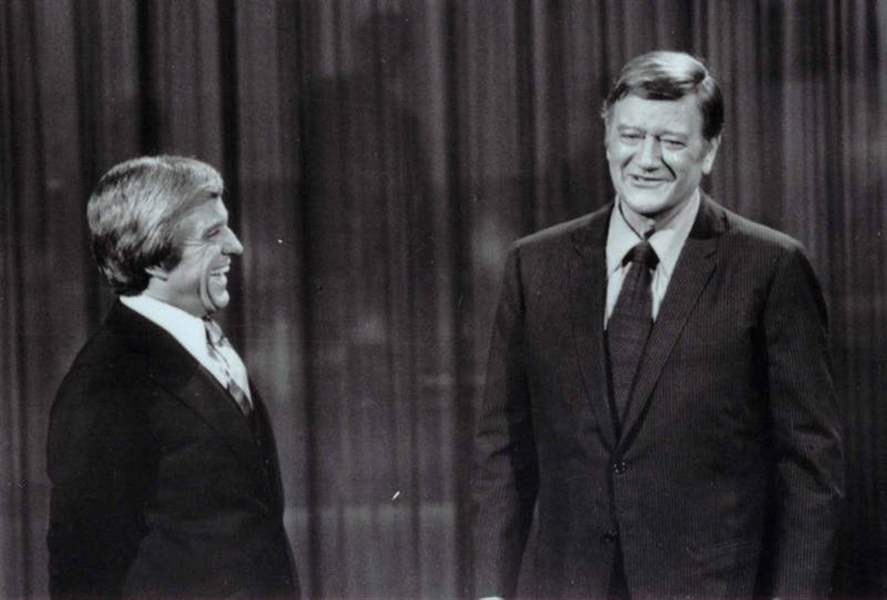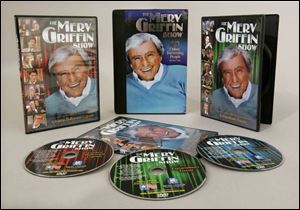
As a host, Merv Griffin would rather comfort than confront
4/27/2006
Many of Merv Griffin s interviews were filmed in black and white. Above, Griffin, left, chats with John Wayne.

Many of Merv Griffin s interviews were filmed in black and white. Above, Griffin, left, chats with John Wayne.
W.W.M.G.D.?
What Would Merv Griffin Do?
What if it were David Letterman behind the desk and not Merv Griffin when, in 1974, the topic of great achievements comes up and the guest, Richard Burton, unleashes his tongue and calls astronauts idiots for their lack of eloquence and great words at the moment of great events?
This happened to Griffin. It happens on The Merv Griffin Show: 40 of the Most Interesting People of Our Time (Alpha, $28.95), a three-disc tribute to his amazing unflappability.
It was during one of those out-of-the-studio interviews Griffin sprinkled through his syndicated afternoon talk show. He found Burton in a small California town shooting a small picture at the end of his career.
This being B.C.C. (Before the Celebrity Culture), they simply chat no publicists in sight, no coached responses. Griffin, in his becalming, nonconfrontational fashion, just converses, and somehow they get on the subject of what man has accomplished in the past century. Not much, Burton says, and Griffin laughs, then Burton launches into his harangue of the moon landing, and Griffin, as expected, nods his head and changes the subject.
If that happened with Letterman, Dave wouldn t let it stand. He would burn bridges, distance himself; if you saw Letterman s brutal takedown of Bill O Reilly a couple of months ago (to O Reilly s squirming discomfort, no less) you saw Letterman at his most dismissive.
The man doesn t suffer fools, and perhaps because of that, he attracts more fools than the average talk show host. Such a comment to Jay Leno might become a misstatement later. On Letterman, it becomes an event. Griffin was more in the middle of course.

The Merv Griffi n Show: 40 of the Most Interesting People of Our Time is a collection of interviews from Griffin s syndicated talk show, which ran from 1962 to 1986. The set harks back to a time when a talk-show host invited his guests just to talk, not to plug their latest books or movies.
Merv was the middle of the road. The name Merv has practically become synonymous with the yellow streak down the center. Which is not to say Griffin was chicken, only welcoming. What a radical idea: That a talk show be about a host who invites guests on to talk, not just sell their latest movie or book. Perhaps because Griffin has so little to add, the famous people he interviews here find it necessary to be clever and insightful, just to fill the dead spots whatever Griffin does, it works. Tom Cruise, just about to blow up with Risky Business, looks shy and unguarded; Ingrid Bergman, interviewed in France while serving as the jury head at Cannes, welcomes the breather.
Griffin, now 80, provides little commentaries before each chat, filling in the details, but doesn t dish on what Robert Kennedy was like, or why Gerald Ford looks so relaxed, or what the impact of Richard Pryor s 1966 appearance was. The creator of Jeopardy! and Wheel of Fortune, Griffin (whose talk shows lasted from 1962 to 1986) is not oblivious to backstage dirt. It s just not in his nature. He was generous to a fault, which these days is a pretty nice fault.
•
I AM A CHILD: You thought Hostel and The Hills Have Eyes were frightening and damaging and degrading to our children s health?
Recently a loose bunch of Boston child-health professionals pounced on the Sesame Workshop and its agenda, especially its new line of toddler DVDs, the first titles of which are Sesame Beginnings: Make Music Together (Sony, $14.98) and Sesame Beginnings: Beginning Together (Sony, $14.98).
The problem (or one of them) is that the American Academy of Pediatrics advocates not parking a child in front of a TV set if the youngster is under age 2.
Sesame Beginnings is designed for children 6 months to 2 years old; it s the first time the Workshop has reached into the infant market. I cannot tell you if these DVDs are a great harm, but I can tell you they are pleasant, gentle primers on the subject.
I suppose they re for children; Sesame Street favorites like Big Bird and Elmo make appearances, along with their respective plush miniature versions.
The focus, though, is so squarely on what a parent can do to stimulate a child s development, what they can do together all day, I can t imagine a kid not getting drooly and passing out within a few minutes anyway. Its practical lessons on how to adjust your routines to the child s mood that day feel invaluable.
•
SOMEONE LEFT THE CAKE OUT IN THE RAIN: If there s a reason to see Charlize Theron in the inert nonstarter Aeon Flux (Paramount, $29.95), it s the inspired miscasting of Frances McDormand as the leader of the futuristic underground rebellion. She wears the worst fright wig since the waning days of Joan Crawford.
What else is there to say? How about this: Why did you go see Aeon Flux in the theater but completely avoided Steve Martin s romantic Shopgirl (Buena Vista, $29.99), Terrence Malick s breathtakingly beautiful The New World (New Line, $27.98), Woody Allen s honest-to-goodness comeback, Match Point (DreamWorks, $29.98), and Pierce Brosnan s delightfully sleazy de-Bond-ification in The Matador (Weinstein, $28.95)?
The latter is a rental, slight, fun. The others demand a big screen, Shopgirl less so. These are the sort of films critics once called Produced and Abandoned. By that they meant abandoned by studios or distributors. Today, there are more avenues of distribution than ever, and more choices than ever. Few movies are abandoned entirely but now the audience makes orphans. It s a war of attrition, and I feel for you, but come on Aeon Flux?
Contact Christopher Borrelli at: cborrelli@theblade.com or 419-724-6117.